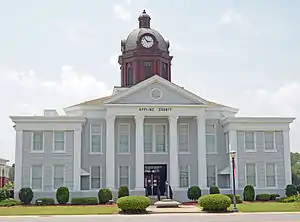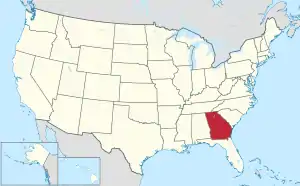Appling County | |
|---|---|
 Appling County Courthouse in Baxley | |
 Location within the U.S. state of Georgia | |
 Georgia's location within the U.S. | |
| Coordinates: 31°45′N 82°17′W / 31.75°N 82.29°W | |
| Country | |
| State | |
| Founded | December 15, 1818 |
| Named for | Daniel Appling |
| Seat | Baxley |
| Largest city | Baxley |
| Area | |
| • Total | 512 sq mi (1,330 km2) |
| • Land | 507 sq mi (1,310 km2) |
| • Water | 5.2 sq mi (13 km2) 1.0% |
| Population (2020) | |
| • Total | 18,444 |
| • Density | 36/sq mi (14/km2) |
| Time zone | UTC−5 (Eastern) |
| • Summer (DST) | UTC−4 (EDT) |
| Congressional district | 1st |
| Website | www |
Appling County is a county located in the southeastern part of the U.S. state of Georgia. As of the 2020 census, the population was 18,444.[1] The county seat is Baxley.[2]
History
Appling County is named for Lieutenant Colonel Daniel Appling, a soldier in the War of 1812.[3] Appling County, the 42nd county created in Georgia, was established by an act of the Georgia General Assembly on December 15, 1818. The original county consisted of Creek lands ceded in the 1814 Treaty of Fort Jackson and the 1818 Treaty of the Creek Agency.
On December 15, 1824, Ware County was formed by the Georgia General Assembly from roughly the southern half of Appling land districts 4, 5, and 6, and all of land districts 7, 8, 9, 10, 11, 12, and 13. On December 24, 1825, Appling County land district 6 was added to Telfair County by an act of the Georgia General Assembly.[4] This created an ambiguity of the border between Telfair County and Ware County that was later solved by additional legislation.
On December 8, 1828, Holmesville, Georgia was declared the county seat by the General Assembly.[5] Previously, court was held at residence of William Carter Jr. In 1836, the General Assembly appointed a seven-member commission to find a location for a more centrally located county seat than Holmesville, but were not able to come to a conclusion. The need for a more central county seat would remain a point of contention in county politics for several decades.
On December 18, 1857, the part of Appling County that was south of Lightsey's Ford on Big Creek downstream to the Little Satilla River was taken from Appling County for the creation of Pierce County.[6]
At the time of the 1850 United States Census, Appling County had a white population of 2,520, a slave population of 404, and 25 free people of color. By the 1860 United States Census, the county had a white population of 3,442, a slave population of 740, and 3 free people of color.
On August 27, 1872, eastern sections of Appling land districts 3 and 4 were added to Wayne County.[7] This area included Wayne County's current county seat Jesup, Georgia, which became the new county seat of Wayne County in 1873. Also in August 1872, the General Assembly called for an election in Appling County to vote on the removal of the county seat to a point along the Macon and Brunswick Railroad. The residents voted for removal and the town of Baxley, Georgia was selected as the new county seat after the election. In February 1873, the General Assembly mistakenly passed a law giving county commissioners to sell the public lands in Holmesville so that the proceeds can go to the construction of a new courthouse in Holmesville. It amended the law a year later for the new courthouse location to read Baxley, as had originally been intended.
On August 18, 1905, Jeff Davis County was created from western portions of Appling County and eastern portions Coffee County.[8] On July 27, 1914, Bacon County was created from parts of Appling County, Pierce County, and Ware County. The remaining section of Appling County that had been located south of Little Satilla River became part of Bacon County.[9]
Geography
According to the U.S. Census Bureau, the county has a total area of 512 square miles (1,330 km2), of which 507 square miles (1,310 km2) is land and 5.2 square miles (13 km2) (1.0%) is water.[10]
The southern two-thirds of Appling County, south of a line from Graham to Baxley, then running due east from Baxley, is located in the Little Satilla River sub-basin of the St. Marys River-Satilla River basin. The northern third of the county is located in the Altamaha River sub-basin of the basin by the same name.[11]
Major highways
Adjacent counties
- Toombs County - north
- Tattnall County - northeast
- Wayne County - southeast
- Pierce County - south
- Jeff Davis County - west
- Bacon County - west
Communities
Cities
Town
Demographics
| Census | Pop. | Note | %± |
|---|---|---|---|
| 1820 | 1,264 | — | |
| 1830 | 1,468 | 16.1% | |
| 1840 | 2,052 | 39.8% | |
| 1850 | 2,949 | 43.7% | |
| 1860 | 4,190 | 42.1% | |
| 1870 | 5,086 | 21.4% | |
| 1880 | 5,276 | 3.7% | |
| 1890 | 8,676 | 64.4% | |
| 1900 | 12,336 | 42.2% | |
| 1910 | 12,318 | −0.1% | |
| 1920 | 10,594 | −14.0% | |
| 1930 | 13,314 | 25.7% | |
| 1940 | 14,497 | 8.9% | |
| 1950 | 14,003 | −3.4% | |
| 1960 | 13,246 | −5.4% | |
| 1970 | 12,726 | −3.9% | |
| 1980 | 15,565 | 22.3% | |
| 1990 | 15,744 | 1.2% | |
| 2000 | 17,419 | 10.6% | |
| 2010 | 18,236 | 4.7% | |
| 2020 | 18,444 | 1.1% | |
| U.S. Decennial Census[12] 1790-1880[13]1890-1910[14] 1920-1930[15] 1930-1940[16] 1940-1950[17] 1960-1980[18] 1980-2000[19] 2010-2020[1] | |||
| Race | Num. | Perc. |
|---|---|---|
| White (non-Hispanic) | 12,674 | 68.72% |
| Black or African American (non-Hispanic) | 3,339 | 18.1% |
| Native American | 33 | 0.18% |
| Asian | 123 | 0.67% |
| Pacific Islander | 1 | 0.01% |
| Other/Mixed | 449 | 2.43% |
| Hispanic or Latino | 1,825 | 9.89% |
As of the 2020 United States census, there were 18,444 people, 6,656 households, and 4,875 families residing in the county.
Education
Politics
| Year | Republican | Democratic | Third party | |||
|---|---|---|---|---|---|---|
| No. | % | No. | % | No. | % | |
| 2020 | 6,570 | 78.31% | 1,784 | 21.26% | 36 | 0.43% |
| 2016 | 5,494 | 78.35% | 1,434 | 20.45% | 84 | 1.20% |
| 2012 | 5,233 | 73.78% | 1,758 | 24.78% | 102 | 1.44% |
| 2008 | 5,085 | 72.62% | 1,846 | 26.36% | 71 | 1.01% |
| 2004 | 4,494 | 70.52% | 1,848 | 29.00% | 31 | 0.49% |
| 2000 | 3,940 | 64.60% | 2,093 | 34.32% | 66 | 1.08% |
| 1996 | 2,572 | 50.44% | 2,070 | 40.60% | 457 | 8.96% |
| 1992 | 2,514 | 41.71% | 2,455 | 40.73% | 1,058 | 17.55% |
| 1988 | 3,000 | 61.74% | 1,837 | 37.81% | 22 | 0.45% |
| 1984 | 2,929 | 59.93% | 1,958 | 40.07% | 0 | 0.00% |
| 1980 | 1,961 | 39.17% | 2,985 | 59.62% | 61 | 1.22% |
| 1976 | 961 | 21.14% | 3,585 | 78.86% | 0 | 0.00% |
| 1972 | 2,755 | 84.33% | 512 | 15.67% | 0 | 0.00% |
| 1968 | 795 | 18.78% | 760 | 17.95% | 2,678 | 63.26% |
| 1964 | 2,597 | 62.44% | 1,562 | 37.56% | 0 | 0.00% |
| 1960 | 717 | 26.65% | 1,973 | 73.35% | 0 | 0.00% |
| 1956 | 506 | 22.74% | 1,719 | 77.26% | 0 | 0.00% |
| 1952 | 713 | 24.65% | 2,179 | 75.35% | 0 | 0.00% |
| 1948 | 289 | 9.01% | 2,268 | 70.72% | 650 | 20.27% |
| 1944 | 387 | 22.70% | 1,318 | 77.30% | 0 | 0.00% |
| 1940 | 312 | 16.94% | 1,514 | 82.19% | 16 | 0.87% |
| 1936 | 140 | 9.61% | 1,309 | 89.84% | 8 | 0.55% |
| 1932 | 64 | 9.62% | 601 | 90.38% | 0 | 0.00% |
| 1928 | 579 | 58.25% | 415 | 41.75% | 0 | 0.00% |
| 1924 | 44 | 17.12% | 212 | 82.49% | 1 | 0.39% |
| 1920 | 196 | 38.51% | 313 | 61.49% | 0 | 0.00% |
| 1916 | 44 | 7.67% | 413 | 71.95% | 117 | 20.38% |
| 1912 | 90 | 15.03% | 360 | 60.10% | 149 | 24.87% |
See also
References
- 1 2 "State & County QuickFacts". United States Census Bureau. Retrieved August 16, 2021.
- ↑ "Find a County". National Association of Counties. Archived from the original on May 31, 2011. Retrieved June 7, 2011.
- ↑ Krakow, Kenneth K. (1975). Georgia Place-Names: Their History and Origins (PDF). Macon, GA: Winship Press. p. 6. ISBN 0-915430-00-2. Archived (PDF) from the original on April 14, 2004.
- ↑ Acts of the General Assembly of the State of Georgia, Passed at Milledgeville, At an Annual Session in November and December. 1825. Vol. 1. Milledgeville, Georgia: Georgia General Assembly. p. 61.
- ↑ Acts of the General Assembly of the State of Georgia, Passed in Milledgeville at an Annual Session in November and December, 1828. Vol. 1. Milledgeville. p. 168.
- ↑ Acts of the General Assembly of the State of Georgia, Passed in Milledgeville, at a Session of the Same, in November and December, 1857. Vol. 1. Milledgeville, Georgia. p. 40.
- ↑ Acts and Resolutions of the General Assembly of the State of Georgia, Passed at its Session in July and August, 1872. Vol. 1. p. 387. Archived from the original on October 2, 2018. Retrieved August 19, 2016.
- ↑ Acts and Resolutions of the General Assembly of the State of Georgia 1905. Vol. 1. Atlanta, Georgia. p. 55.
- ↑ Acts and Resolutions of the General Assembly of the State of Georgia 1914. Vol. 1. Atlanta, Georgia. p. 23.
- ↑ "US Gazetteer files: 2010, 2000, and 1990". United States Census Bureau. February 12, 2011. Retrieved April 23, 2011.
- ↑ "Georgia Soil and Water Conservation Commission Interactive Mapping Experience". Georgia Soil and Water Conservation Commission. Archived from the original on October 22, 2016. Retrieved November 27, 2015.
- ↑ "Decennial Census of Population and Housing by Decades". US Census Bureau.
- ↑ "1880 Census Population by Counties 1790-1800" (PDF). US Census Bureau. 1880.
- ↑ "1910 Census of Population - Georgia" (PDF). US Census Bureau. 1910.
- ↑ "1930 Census of Population - Georgia" (PDF). US Census Bureau. 1930.
- ↑ "1940 Census of Population - Georgia" (PDF). US Census Bureau. 1940.
- ↑ "1950 Census of Population - Georgia -" (PDF). US Census Bureau. 1950.
- ↑ "1980 Census of Population - Number of Inhabitants - Georgia" (PDF). US Census Bureau. 1980.
- ↑ "2000 Census of Population - Population and Housing Unit Counts - Georgia" (PDF). US Census Bureau. 2000.
- ↑ "Explore Census Data". data.census.gov. Retrieved December 14, 2021.
- ↑ Leip, David. "Dave Leip's Atlas of U.S. Presidential Elections". uselectionatlas.org. Retrieved March 18, 2018.
External links
- GeorgiaInfo.com Appling County Courthouse info
- Appling County historical marker